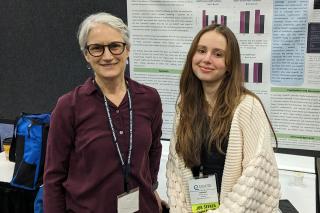Mathematics and Computer Science major Raneem Emad Amer Mousa ’25 is pursuing the Dual-Degree in Engineering Simmons offers in collaboration with Columbia University. Her research project, “Is ChatGPT the Academic Catalyst We’ve All Been Waiting For?” was accepted for inclusion in the SIGCSE Technical Symposium 2024. We spoke to Mousa about her research, and how Simmons has supported her interests.
“I thought that SURPASS [The Summer Undergraduate Research Program at Simmons] was only for Chemistry and Physics. I didn’t know I could also do research in Math and Computer Science,” recalls Raneem Emad Amer Mousa, who was interested in researching Artificial Intelligence (AI) and its use in academic settings.
Mousa brought her research idea to Professor Nanette Veilleux. “She told me to be more specific, so I decided to focus on ChatGPT,” says Mousa. Developed by OpenAI, ChatGPT is a chatbot that generates text based on large language models. Since its launch in 2022, it has been the subject of scrutiny for its use by students in completing assignments. Her proposal was accepted by SURPASS.
“The project is to check whether ChatGPT impacts STEM education,” says Mousa. She began with four groups of students, two sets of Math majors and two of Computer Science. Given a set of questions, two groups were to generate their answers on their own, while the others used ChatGPT. “I wanted to see whether we could spot the use of AI or not,” says Mousa. “I wanted to gauge how the quality of their answers differed, and how confident they were in their answers.”
While the results of the study weren’t entirely conclusive, they led to interesting ideas. “We got some ideas of how to use ChatGPT, when it’s right and when it’s wrong. It was inefficient in programming and broke under certain circumstances. However, the real disappointment comes in mathematics. It gives explanations that are on point and would be a great tool to help in understanding a concept, but it arrives at the wrong final answer due to arithmetic errors, which is where students get trapped.”
As for her own text-based experiments with AI, Mousa said, “I find ChatGPT useful for checking grammar, but if you ask it to write for you, it doesn’t sound like you wrote it. It sounds robotic.”
Mousa created a poster presentation, which she was invited to present at the SIGCSE Technical Symposium in Portland, Oregon this March. “It was a great experience,” she says. “I felt like everyone was very interested in AI and education, and they gave me a lot of ideas for future projects.” Mousa was so engaged with interested conference-goers that, by the end of the two hour poster session, she had lost her voice. “It was very rewarding!”
While in high school, Mousa excelled at Math. “I took my first programming class at Simmons with Professor Nanette Veilleux,” she says. “That class inspired me to dual major in Computer Engineering.” Now, two years into the 3+2 program, she has one more year of study at Simmons to complete before starting the final two years at Columbia.
“Honestly, the 3+2 program was the most eye-catching for me, when I was searching for colleges,” she says. “I want to get a good foundation in STEM before studying Computer Engineering.” She was also drawn to Simmons for the small class sizes and supportive faculty. “The process of learning at Simmons is very interactive. Students can chat with professors and ask questions in class.” It also offered an easier transition from her high school. “I feel comfortable here. We empower each other.”
And Mousa encourages students to investigate research opportunities. “I was able to do independent research with [faculty] guidance, but they let me use my creativity and ideas and lead it on my own. Professors are also doing their own research and will often let you join them.”
She encourages students to see what research their peers are doing and see what sparks their own curiosity. “Don’t be afraid to reach out to your professors,” says Mousa. “Ask them questions, brainstorm ideas, and develop your own unique project. Simmons provides a support system and resources to earn a well-rounded education.”

